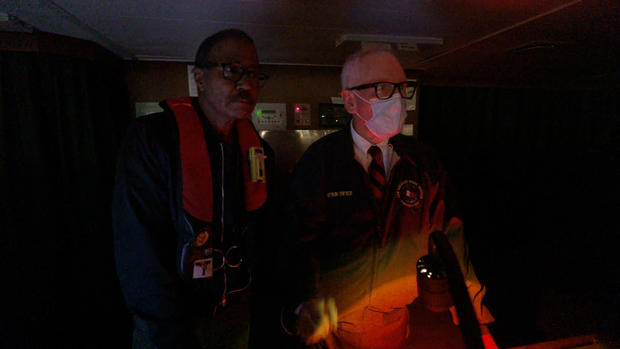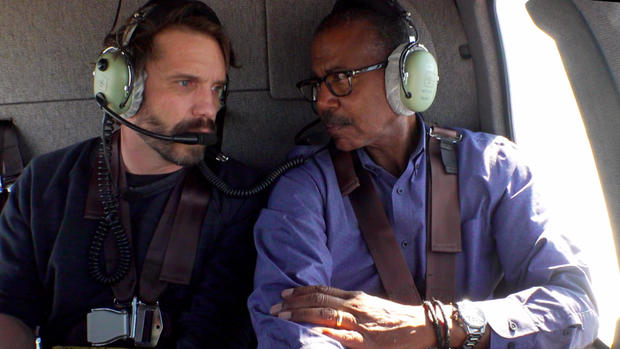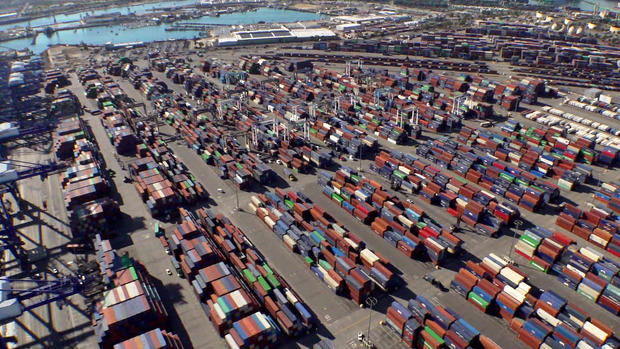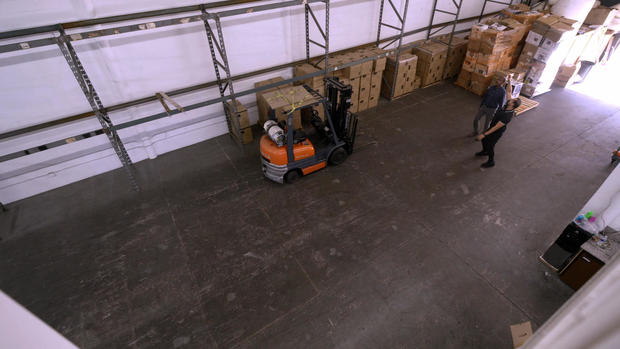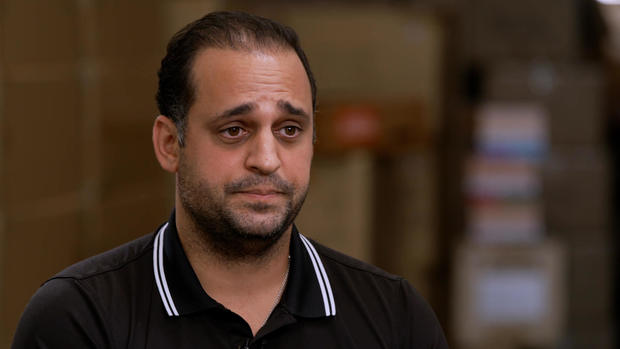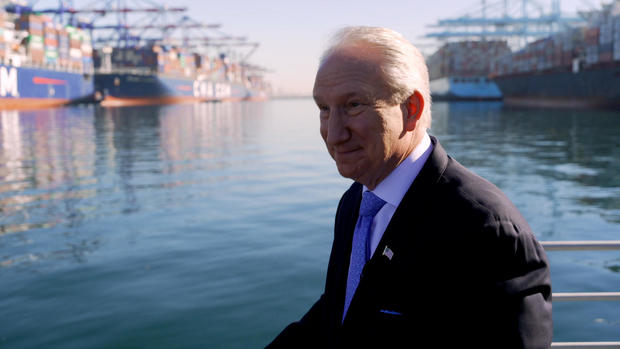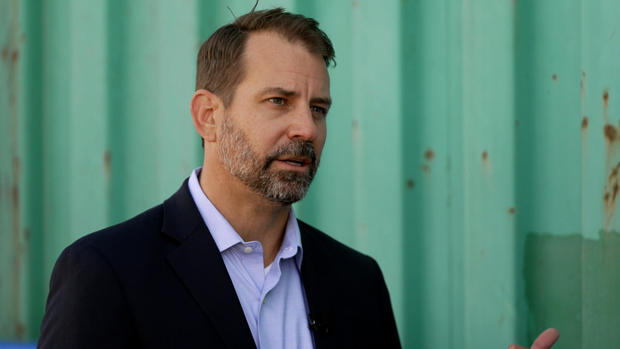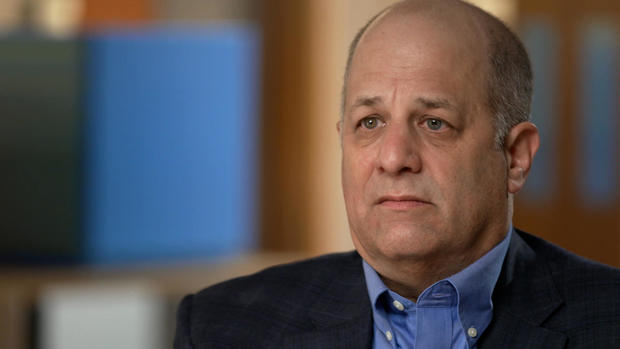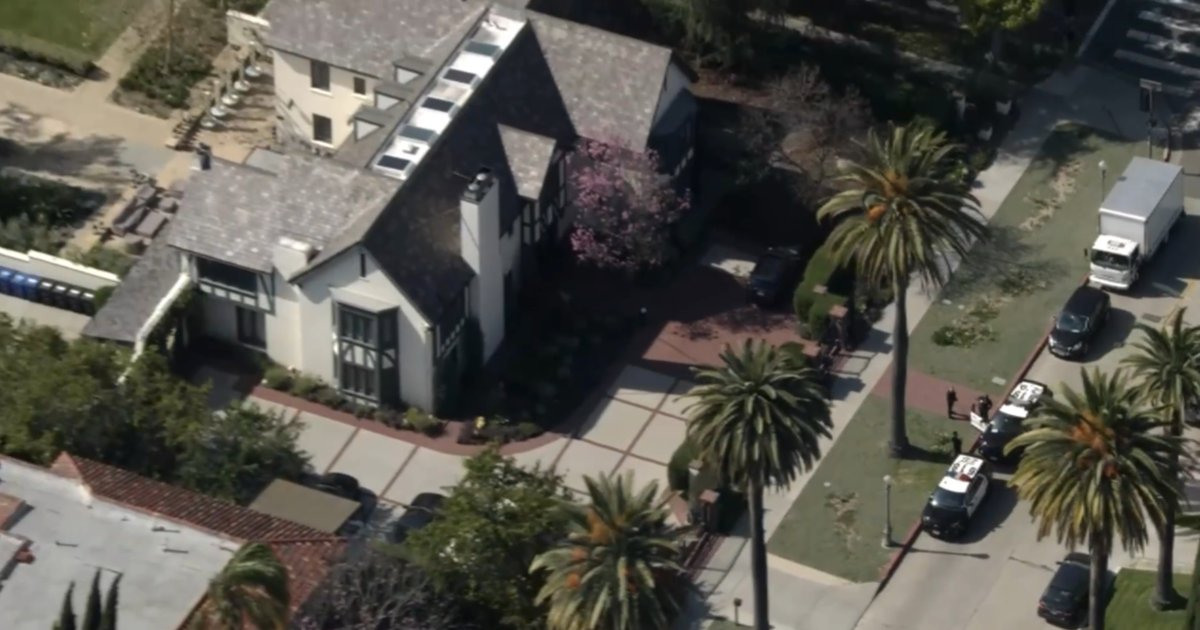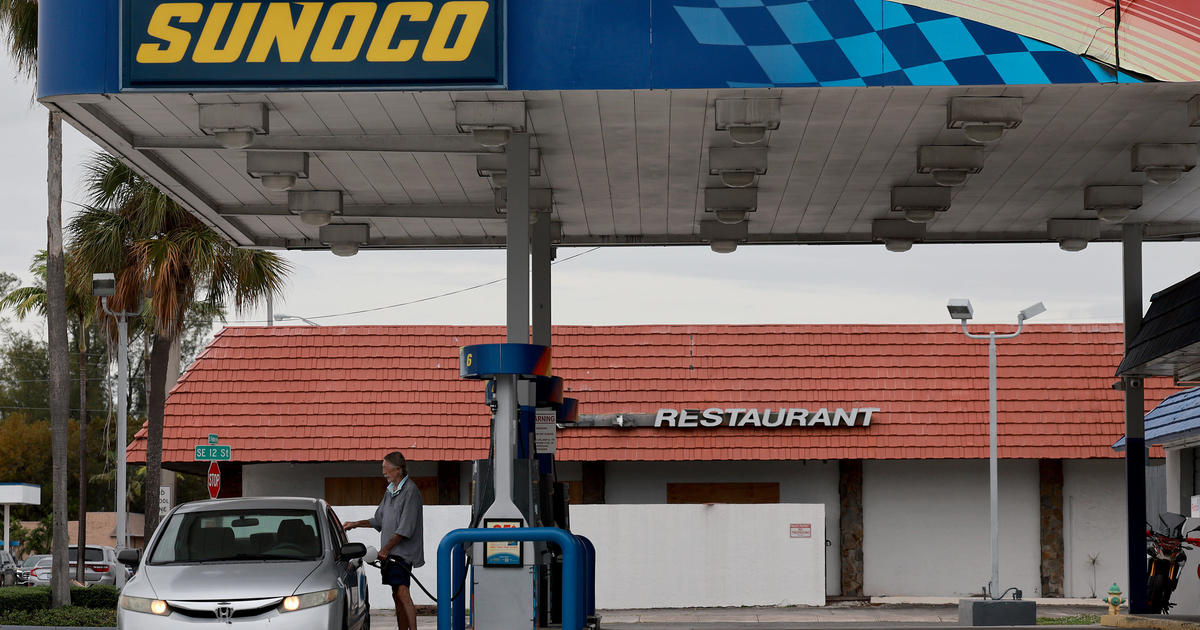Packed ports and empty shelves: Inside the issues behind the U.S. supply chain crisis
You better watch out, you better not cry, you better not pout—or maybe you should. Millions of dollars' worth of holiday presents and other goods Americans have ordered are stuck on giant container ships, waiting for a space to unload at the ports of Los Angeles and Long Beach. Call it a case of Freight Expectations. There's so much cargo arriving from Asia, that some of it has been diverted to other ports in the country. It's led to an epic traffic jam that no one seems able to untangle and it's revealed deep flaws in America's supply chain. What started as a shop-from-home binge during the pandemic has had lasting effects. Retailers warn these holidays will be marked by empty shelves, higher prices, and lost jobs unless the backlog is cleared. We wanted to see what it's like in the busiest ports in the country but first, we had to get on board.
Space at the Long Beach docks is so tight that when a slot opened up at 1 a.m., The port pilots wasted no time. They sped off into the dark and so did we, following captain James Dwyer up a rope ladder, as he climbed aboard to guide the giant ship, the ever linking, to an open berth.
Captain James Dwyer: We're inbound for LA berth 405.
Steering the ship through the harbor, he told us pilots are handling twice the usual number of vessels.
Captain James Dwyer: Right now we're in-- just in our slow turn to port to get onto the main channel.
With the port glittering in the distance, Captain Dwyer, from the bridge, slowly turned the 100,000-ton ship around.
Captain James Dwyer: Stop engine.
Bill Whitaker: We'll back up?
Captain James Dwyer: Yes sir, we're going to go stern first. Bow stop...
We found this feat of parallel parking, unparalleled.
Captain James Dwyer: Push easy...
For the last few yards and inches, Captain Dwyer stuck his head out the window to guide the behemoth in by sight.
Captain Dwyer: Can we let go of the tug line aft, let go of the tug line, ease easy.
It turns out docking a ship the size of three football fields is the easy part.
Bill Whitaker: How about that.
Getting the goods from here to store shelves is proving to be a lot more daunting. It used to take two days to get cargo off the docks. Now, it takes nine. To see why, we took to the air with Ryan Petersen, CEO of Flexport, a technology company that buys and sells cargo space.
Bill Whitaker: Look at how packed this is here.
Ryan Petersen: Yeah, totally packed.
We flew over the sprawling Ports of Los Angeles and Long Beach – 40% of all U.S. imports come through here. We saw stacks of marooned containers, dormant cranes, loaded rail cars sitting idle. The country's busiest ports packed to the gills. And out at sea? More than 80 ships stretched to the distance—a new record. They used to pull right in. Now, they can wait weeks. Petersen told us this backlog has been building since the start of the pandemic.
Bill Whitaker: Is it getting worse?
Ryan Petersen: It's definitely getting worse. It's as bad as it's ever been right now. Right there do you see all those blue cranes? There's no ship--
Bill Whitaker: That makes no sense
Ryan Petersen: That's what-- that's what I say. It makes no sense until you realize, hey, the yard is totally full. See how high those stacks are? Totally jammed up.
Bill Whitaker: So when you see this, what-- what does this say to you?
Ryan Petersen: I think a lot of businesses are at risk. If they can't get their products in in time for the holiday season. And of course it also means consumers are going to pay really high prices for everything.
Bill Whitaker: So this is what inflation looks like?
Ryan Petersen: Yeah, this is inflation first-hand.
The problems at the ports have cascaded across the country. So we followed the supply chain from the choked Ports of LA and Long Beach to rail yards in Chicago. Along the way we found chaos, finger-pointing, huge profits and massive losses. And everywhere, frustration.
Bobby Djavaheri's frustration was palpable when he lifted his warehouse door to show us inside.
Bill Whitaker: So what—what should this look like?
Bobby Djavaheri: Yeah you-- you right here, you wouldn't be able to walk in here. I mean, we got boxes all the way to the ceiling. This would be fully full.
Bill Whitaker: So what do you think when you see it like this?
Bobby Djavaheri: It's unbelievable. There's never been a month that's that's-- that's empty – ever. The fact that Christmas is around the corner and it's empty, it's shocking.
Djaverheri runs Yedi Houseware, he imports household appliances from China. He told us his goods have been delayed for six months. Now, he has thousands of orders he can't fill and his shipping costs have soared from $2,000 a container, to as high as $25,000. He blames this crisis on the ocean carriers.
Bobby Djavaheri: I call them pirates of the sea. They're 100 percent price-gouging and no one's done anything about it.
Bill Whitaker: It's not just market forces?
Bobby Djavaheri: No. No. I-- I really don't buy it. It's price-gouging and it's someone taking advantage.
Bill Whitaker: And it's hurting your business?
Bobby Djavaheri: Yeah, it's hurting my business and many other people's businesses.
Gene Seroka: There's too much coming in through the U.S. supply chain and it's not leaving the port fast enough.
Bill Whitaker: So that's why you've got these ships backed up here?
Gene Seroka: That's right.
Gene Seroka is the executive director of the LA Port. He told us the entire system has been overwhelmed by the tsunami of orders flooding in from Asia.
Bill Whitaker: Who is making money off of this? Who is benefitting from this backlog?
Gene Seroka: Liner shipping companies will make record profits this year again. They're booking more cargo than ever before. There's a supply/demand issue.
Bill Whitaker: So the price just keeps going up and up?
Gene Seroka: Prices skyrocketed on these trans-Pacific trade routes. There's money being made.
This month, the world's largest shipping line, Maersk, reported record profits of $16 billion — up 68% from last year. The ocean carriers — most headquartered in Europe or Asia — say demand for cargo space keeps rising. They blame a shortage of truckers at the port.
Bill Whitaker: Take an empty in, take a full container out. Where is this falling apart?
Matt Schrap: In the fact that we, because of the booking systems, have restrictions on the type of container that you can bring in.
Matt Schrap of the Harbor Trucking Association told us there's no driver shortage at the ports. He says it's the antiquated booking system that's gumming up the works. Schrap told us normally truckers make an appointment to return an empty container before picking up a full one. But with so little space at the ports, there are new restrictions on even the color of container that can be returned. Truckers can wait hours in line only to be turned away because there's no room.
Bill Whitaker: Some of the terminals will say that the no-shows of your drivers. Fifty percent of the time they don't show up. How do you explain that?
Matt Schrap: Well, we make appointments because we don't know sometimes until the day of whether or not we're gonna be able to return an empty container back into that marine terminal. And then all of a sudden the day of, they say, "Sorry, we're not taking any more rust-colored containers." So it's just—you know, it's just—it's a game of whack- a-mole, literally.
The result: lots like this, full of empty containers sitting on chassis, the undercarriage that holds the container and attaches to a truck.
Matt Schrap: Without a chassis you cannot move those containers off of dock. And the majority of chassis are sitting under empty containers, strewn around California.
Bill Whitaker: So the chassis are necessary to move the full containers out of the port?
Matt Schrap: Absolutely.
Bill Whitaker: But most of these chassis are now being used just to hold empty containers.
Matt Schrap: That's correct.
Bill Whitaker: This is the definition of a bottleneck.
Matt Schrap: Absolutely.
That's not the only chokepoint. In Chicago, we met Rick Woldenberg at his family's toy business, Learning Resources. Every year he imports toys from China and brings them here by rail. He told us, this year has been a nightmare.
Bill Whitaker: How long is it taking to get the product from Los Angeles here?
Rick Woldenberg: I'd estimate that the domestic lead time is 45 days. And that's unbelievably slow. Pony Express could have gotten it here faster.
Woldenberg told us he tried to avoid the backlog by placing his Christmas orders in May, only to hit a monumental snag in Chicago.
There was so much cargo at the rail yards that his containers got stuck at the bottom of a pile for nine weeks. He told us it was like having his toys held hostage. The kicker? The rail line charged him for "storage." This on top of paying $30,000 for a container from China, ten times what he paid last year.
Rick Woldenberg: If that were as bad as it was, that would still be horrible but it gets worse because we get penalized for storage. And that's where it becomes the theatre of the absurd. So, the $25,000 to $30,000 is the market gone berserk but penalties are a punishment that is unconscionable.
Bill Whitaker: So wait a minute your-- your cargo is being held up?
Rick Woldenberg: Right
Bill Whitaker: For nothing you have done wrong?
Rick Woldenberg: Correct
Bill Whitaker: You can't go pick it up?
Rick Woldenberg: Correct.
Bill Whitaker: But you have to pay for it to be stored?
Rick Woldenberg: Correct.
The rail yards told us it was all due to congestion. Rick Woldenberg told us he paid almost a million dollars in storage fees in September alone.
Bill Whitaker: Can you afford this?
Rick Woldenberg: No, I can't. It's impossible to absorb this kind of expense so we had to raise our prices. These penalties are gratuitous. They're not incurring extra expenses because of this.
Bill Whitaker: It sounds like you're saying they're charging you extra because they can.
Rick Woldenberg: Sure feels like it.
Now, with inflation the highest in 30 years and the holidays fast-approaching, there's a flurry of plans to break the logjam. Starting tomorrow, Gene Seroka, who runs the LA Port, says he'll fine the shipping lines for any cargo that sits on the docks more than nine days. And last month, President Joe Biden announced the ports had agreed to work round-the-clock. But it hasn't had much effect.
Gene Seroka: We typically work about 19 hours a day here. It's that 3 to 8 a.m. shift that we've added and tried to get others to work with us during those times as well.
Bill Whitaker: So you might be working 24/7 but the warehouses are not.
Gene Seroka: That's right.
Bill Whitaker: So they have no place for these goods to go after they get off the ship at 3:00 in the morning.
Gene Seroka: And there, you've just diagnosed the problem. The cargo has nowhere to go. We've gotta get a workforce in the warehouses and the trucking industry that are complementary to all this cargo that is—that's coming in right now.
Bill Whitaker: There is a lot of finger-pointing.
Gene Seroka: Yes, there is.
Bill Whitaker: The truckers blame the terminals, the terminals blame the shippers, the retailers blame the truckers and the shippers. How do you get that contentious group to sit at the table, stop pointing fingers, and actually clear out this backlog?
Gene Seroka: That's been the toughest part. We haven't moved the needle yet, but it's not for a lack of trying and we're going to have to just double down.
The whole supply chain mess has put a spotlight on glaring deficiencies in U.S. infrastructure. Flexport's Ryan Petersen says there's no quick fix and the $17 billion in the infrastructure bill for upgrading America's ports may not be enough.
Ryan Petersen: See Singapore alone is building a $20 billion container terminal right now.
Bill Whitaker: How did we get to this? I mean, I've seen the ports in Rotterdam and in Hong Kong and they are light years ahead of us.
Ryan Petersen: One problem with the U.S. system is-- we-- the ports are owned by the cities that they're in. And ultimately the capital expenditure for building terminals, for dredging, for you know, for investing in these ports comes down to decisions made at a local level. You know, this is a national infrastructure, it's to serve the entire country. So there's a real role for federal government to come in and step in.
The White House has put a top-level task force on the problem, but other than twisting arms and wrangling concessions, there's not much it can do in an industry dominated by private companies, foreign shipping lines and local port authorities. And no one we spoke with expects a Christmas miracle.
Produced by Heather Abbott. Associate producer, LaCrai Mitchell. Broadcast associate, Emilio Almonte. Edited by Craig Crawford.
